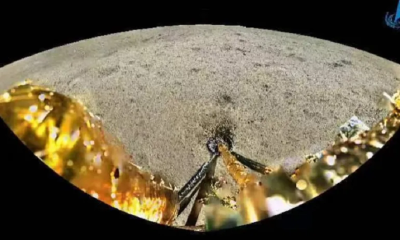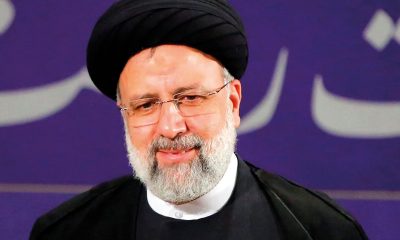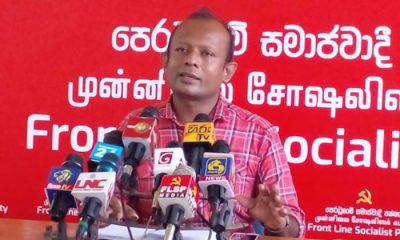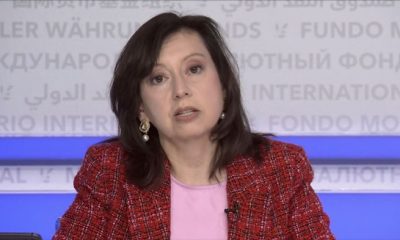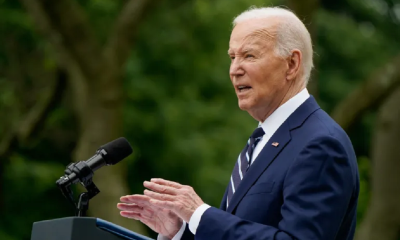Features
“Sri Lanka cannot be used as a base for any threats against India” – President

In an interview with FRANCE 24 on the side-lines of the Summit for a New Global Financing Pact in Paris, Sri Lankan President Ranil Wickremesinghe responded to questions posed by FRANCE 24. Following are excerpts of the interview:
Q. You became president in a very difficult situation for your country. There was street protest triggered by the country’s worst economic crisis since its independence. Sri Lanka has defaulted. It has reached a deal with the International Monetary Fund back in March. And there are reports by the Reuters news agency that the World Bank is about to approve $700 million in budgetary and welfare support at its next board meeting. Can you confirm that this is indeed happening?
A. We are anticipating money from the World Bank. So far, we have fulfilled all the benchmarks and therefore we are qualifying for the assistance from the World Bank. It’s a much-needed money at the moment and will certainly help to strengthen the economy.
Q. So $700 million is the figure you’re expecting or more?
A. I hope it’s more. If there is more I’m not going to complain.
Q. Obviously, here in Paris and I assume in many other arenas where you’re traveling and participating, the issue of your debt is extremely important because you need financial oxygen. Obviously, your debt, external debt, stands at $42 billion, I believe. Are you making progress with the different creditors? There’s the Paris Group. There’s China. Are you making progress?
A. Discussions are going on with the different groups. We have an agreement with Lazard to represent us. And the debt restructuring program will be presented to Cabinet on Wednesday. I think over the weekend they’re hoping to finalize it. It will go to Parliament on Friday before the Public Finance Committee. Then Saturday and Sunday it will be debated in Parliament and will be approved by Parliament. Thereafter, we can start the rest of the negotiations with our creditors.
Q. Right. What’s in this plan? What’s the idea, to postpone the debt, to reduce it or a combination of both, what’s the idea?
A. Well, it’s a question of giving a longer period for repayment. And we’ve also been looking at some form of a reduction in the amount due. So those are being discussed now. And hopefully by Sunday or Monday, the final document will be available to us.
Q. OK. So you’re making progress both with China and other creditors?
A. With China, Lazard is discussing with all and also Sri Lanka. We’ve been discussing with all the creditors and with China also. I mean, China has not joined the Common Platform, but they’ve been there at every meeting. And all details have been shared with China. China has shared information with them. So except for formally being on the platform, China has been a party and is aware of all the information that is being shared.
Q. Right. In Paris, there was an agreement on the debt from Zambia with both the Western creditors and China. Is this a good omen for a country which shows, obviously every situation is different, that there is indeed a possibility to find an agreement with both China and other creditors?
A. No, we are confident of China coming along with the others. The Zambian one was announced this week and it’s good that China has been able to sort out Zambia. I listened to the speech of the Chinese Prime Minister both yesterday at the dinner, working dinner and today, it shows China, for the first time China has shown its approach to the whole issue of debt restructuring. And it’s a positive message.
Q. Right. Speaking of China, there has been speculation about China’s presence in Sri Lanka. There have been reports, especially in the American press, that there could be a military presence in Sri Lanka. Is this the case? And do you rule it out for the future?
A. Well, Chinese have been there for about 1,500 years. So far, there has been no military base. There is a lot of speculation about the Hambantota Habour. We’ve called for it and it’s been given out to China Merchants. But the security is controlled by the Government of Sri Lanka. The Southern Naval Command will be shifted to Hambantota. We’ve got one brigade stationed in Hambantota and the nearby areas and there certainly has been no issue of military use by the Chinese.
The same company also runs a terminal in the Colombo Harbour, in the South Port and that’s where warships come to all countries. Now, no one is complaining of the terminal they are running in Colombo. They are only complaining about the terminal and the port that they are managing in Hambantota. No. We have no military agreements with China. There won’t be any military agreements. I don’t think China enters into one. We are a neutral country, but we also emphasize on the fact that we cannot allow Sri Lanka to be used as a base for any threats against India.
Q. Right. You recently declared, some groups involved in traditional politics are actively working to hinder our economic revival, they are spreading false information and misleading the public with claims that we are selling off the country. What exactly do you have in mind?
A . There have been people who say we have been selling off the country.
Q. Who are these people, Mr. President?
A. Part of the opposition. Part of other groups. So I just pointed out each achievement we had and I asked, is that selling off the country? If we reduce the price of fuel, is it selling off the country? We are working with foreign economies, not only western but also eastern like Japan, Korea, China. And working with them does not mean we are selling off the country.
It means that we are developing the economy and I asked them to reply. It’s just a sort of debate that goes on in Sri Lankan politics. They have not been able to reply. So I think there are other issues also that we have asked them. So I asked them, what I have told all the parties is we are in a very difficult situation now. Let’s all get together and look at how we resolve it. And then when you go to the elections, next time you can say we have all been stakeholders in this development.
But if you all keep criticizing in the old way without any other reasonable alternative, the fact is that the voters will turn you out. So it’s much better for us to start a new political culture where we can all work together.
Q. Right. Speaking of bringing people together, the cabinet has approved a proposal to establish a South African style truth and reconciliation commission. Will it happen and will it satisfy the demands from the Tamils from the island? They have asked for an international probe into war crimes.
A. Truth and reconciliation commission has been agreed by all and that’s one of the conditions that the Geneva Human Rights Commission has also taken up. It was drafted some time ago but after I became president, I’ve been talking to them. Even today I spoke to President Ramaphosa about the commission and for them to come and help us. This is what we wanted and I will get it passed in parliament by August. And already we are making plans to set up the secretariat.
We require the South African assistance. There will be a lot of foreign observers, independent observers. So that’s within the framework that we have so far specified.
Q. When do you expect it to begin?
A. I would think that in my view, the legislation will be enacted by August.
Q. Right. There’s also talk about granting political autonomy to the Tamil. What about that?
A. Tamils are in different parts of the country and have different categories. If you look at it, you have the Tamils in the North and the East.
Then the Tamils of the hill country, whose origin traces back to India. Now we have been sorting out a lot of the issues there. In fact, the Tamils have been given voting rights in one area, one district called Nuwara Eliya, where all of a sudden, the majority, the Sinhala majority became a minority and the Tamils have become a majority. That has not happened in many countries that I am aware of. But we have to uplift the economic and social standards of the Tamils living in those areas.
They take part in the politics and they have members serving in the central cabinet. As far as the North is concerned, especially the leaders and members of the Tamil parties have been asking for the government to ensure that the devolution package which is in the Constitution is implemented.
Q. Will it be?
A. It has been implemented, but the central government will not interfere in it. We have given that guarantee and we are prepared to bring legislation. I have told them, in addition, they have asked for some of the other powers, not only for the North, but for all the nine provinces. It has been supported by some of the former chief ministers in the other areas. So we are having discussions. I think we can identify some more subjects to come under the purview of the provincial councils.
Q. Right. There was a report that was published just a couple of days ago mentioning the role of your predecessor, President Gotabaya Rajapaksa, in hampering some investigations into mass graves that were found during the fighting, obviously, in the 1980s and 1990s. Should there be investigations about his role, about the role of others, or is the Truth and Reconciliation Commission the only way to turn the page?
A. Well, I would like any allegations to come before the Truth and Reconciliation Commission, because it is about to be implemented. But if you are going to run a parallel investigation, we are only undermining the Truth and Reconciliation Commission. Any complaints anyone has can go before the Truth and Reconciliation Commission.
Q. And it can involve anyone, eventually, former, very senior figures?
A. No, they can call the former president or anyone else. And the fact is, no one can say it’s a cover-up, because you’ll be having foreign observers.
Features
The heart-friendly health minister

by Dr Gotabhya Ranasinghe
Senior Consultant Cardiologist
National Hospital Sri Lanka
When we sought a meeting with Hon Dr. Ramesh Pathirana, Minister of Health, he graciously cleared his busy schedule to accommodate us. Renowned for his attentive listening and deep understanding, Minister Pathirana is dedicated to advancing the health sector. His openness and transparency exemplify the qualities of an exemplary politician and minister.
Dr. Palitha Mahipala, the current Health Secretary, demonstrates both commendable enthusiasm and unwavering support. This combination of attributes makes him a highly compatible colleague for the esteemed Minister of Health.
Our discussion centered on a project that has been in the works for the past 30 years, one that no other minister had managed to advance.
Minister Pathirana, however, recognized the project’s significance and its potential to revolutionize care for heart patients.
The project involves the construction of a state-of-the-art facility at the premises of the National Hospital Colombo. The project’s location within the premises of the National Hospital underscores its importance and relevance to the healthcare infrastructure of the nation.
This facility will include a cardiology building and a tertiary care center, equipped with the latest technology to handle and treat all types of heart-related conditions and surgeries.
Securing funding was a major milestone for this initiative. Minister Pathirana successfully obtained approval for a $40 billion loan from the Asian Development Bank. With the funding in place, the foundation stone is scheduled to be laid in September this year, and construction will begin in January 2025.
This project guarantees a consistent and uninterrupted supply of stents and related medications for heart patients. As a result, patients will have timely access to essential medical supplies during their treatment and recovery. By securing these critical resources, the project aims to enhance patient outcomes, minimize treatment delays, and maintain the highest standards of cardiac care.
Upon its fruition, this monumental building will serve as a beacon of hope and healing, symbolizing the unwavering dedication to improving patient outcomes and fostering a healthier society.We anticipate a future marked by significant progress and positive outcomes in Sri Lanka’s cardiovascular treatment landscape within the foreseeable timeframe.
Features
A LOVING TRIBUTE TO JESUIT FR. ALOYSIUS PIERIS ON HIS 90th BIRTHDAY

by Fr. Emmanuel Fernando, OMI
Jesuit Fr. Aloysius Pieris (affectionately called Fr. Aloy) celebrated his 90th birthday on April 9, 2024 and I, as the editor of our Oblate Journal, THE MISSIONARY OBLATE had gone to press by that time. Immediately I decided to publish an article, appreciating the untiring selfless services he continues to offer for inter-Faith dialogue, the renewal of the Catholic Church, his concern for the poor and the suffering Sri Lankan masses and to me, the present writer.
It was in 1988, when I was appointed Director of the Oblate Scholastics at Ampitiya by the then Oblate Provincial Fr. Anselm Silva, that I came to know Fr. Aloy more closely. Knowing well his expertise in matters spiritual, theological, Indological and pastoral, and with the collaborative spirit of my companion-formators, our Oblate Scholastics were sent to Tulana, the Research and Encounter Centre, Kelaniya, of which he is the Founder-Director, for ‘exposure-programmes’ on matters spiritual, biblical, theological and pastoral. Some of these dimensions according to my view and that of my companion-formators, were not available at the National Seminary, Ampitiya.
Ever since that time, our Oblate formators/ accompaniers at the Oblate Scholasticate, Ampitiya , have continued to send our Oblate Scholastics to Tulana Centre for deepening their insights and convictions regarding matters needed to serve the people in today’s context. Fr. Aloy also had tried very enthusiastically with the Oblate team headed by Frs. Oswald Firth and Clement Waidyasekara to begin a Theologate, directed by the Religious Congregations in Sri Lanka, for the contextual formation/ accompaniment of their members. It should very well be a desired goal of the Leaders / Provincials of the Religious Congregations.
Besides being a formator/accompanier at the Oblate Scholasticate, I was entrusted also with the task of editing and publishing our Oblate journal, ‘The Missionary Oblate’. To maintain the quality of the journal I continue to depend on Fr. Aloy for his thought-provoking and stimulating articles on Biblical Spirituality, Biblical Theology and Ecclesiology. I am very grateful to him for his generous assistance. Of late, his writings on renewal of the Church, initiated by Pope St. John XX111 and continued by Pope Francis through the Synodal path, published in our Oblate journal, enable our readers to focus their attention also on the needed renewal in the Catholic Church in Sri Lanka. Fr. Aloy appreciated very much the Synodal path adopted by the Jesuit Pope Francis for the renewal of the Church, rooted very much on prayerful discernment. In my Religious and presbyteral life, Fr.Aloy continues to be my spiritual animator / guide and ongoing formator / acccompanier.
Fr. Aloysius Pieris, BA Hons (Lond), LPh (SHC, India), STL (PFT, Naples), PhD (SLU/VC), ThD (Tilburg), D.Ltt (KU), has been one of the eminent Asian theologians well recognized internationally and one who has lectured and held visiting chairs in many universities both in the West and in the East. Many members of Religious Congregations from Asian countries have benefited from his lectures and guidance in the East Asian Pastoral Institute (EAPI) in Manila, Philippines. He had been a Theologian consulted by the Federation of Asian Bishops’ Conferences for many years. During his professorship at the Gregorian University in Rome, he was called to be a member of a special group of advisers on other religions consulted by Pope Paul VI.
Fr. Aloy is the author of more than 30 books and well over 500 Research Papers. Some of his books and articles have been translated and published in several countries. Among those books, one can find the following: 1) The Genesis of an Asian Theology of Liberation (An Autobiographical Excursus on the Art of Theologising in Asia, 2) An Asian Theology of Liberation, 3) Providential Timeliness of Vatican 11 (a long-overdue halt to a scandalous millennium, 4) Give Vatican 11 a chance, 5) Leadership in the Church, 6) Relishing our faith in working for justice (Themes for study and discussion), 7) A Message meant mainly, not exclusively for Jesuits (Background information necessary for helping Francis renew the Church), 8) Lent in Lanka (Reflections and Resolutions, 9) Love meets wisdom (A Christian Experience of Buddhism, 10) Fire and Water 11) God’s Reign for God’s poor, 12) Our Unhiddden Agenda (How we Jesuits work, pray and form our men). He is also the Editor of two journals, Vagdevi, Journal of Religious Reflection and Dialogue, New Series.
Fr. Aloy has a BA in Pali and Sanskrit from the University of London and a Ph.D in Buddhist Philosophy from the University of Sri Lankan, Vidyodaya Campus. On Nov. 23, 2019, he was awarded the prestigious honorary Doctorate of Literature (D.Litt) by the Chancellor of the University of Kelaniya, the Most Venerable Welamitiyawe Dharmakirthi Sri Kusala Dhamma Thera.
Fr. Aloy continues to be a promoter of Gospel values and virtues. Justice as a constitutive dimension of love and social concern for the downtrodden masses are very much noted in his life and work. He had very much appreciated the commitment of the late Fr. Joseph (Joe) Fernando, the National Director of the Social and Economic Centre (SEDEC) for the poor.
In Sri Lanka, a few religious Congregations – the Good Shepherd Sisters, the Christian Brothers, the Marist Brothers and the Oblates – have invited him to animate their members especially during their Provincial Congresses, Chapters and International Conferences. The mainline Christian Churches also have sought his advice and followed his seminars. I, for one, regret very much, that the Sri Lankan authorities of the Catholic Church –today’s Hierarchy—- have not sought Fr.
Aloy’s expertise for the renewal of the Catholic Church in Sri Lanka and thus have not benefited from the immense store of wisdom and insight that he can offer to our local Church while the Sri Lankan bishops who governed the Catholic church in the immediate aftermath of the Second Vatican Council (Edmund Fernando OMI, Anthony de Saram, Leo Nanayakkara OSB, Frank Marcus Fernando, Paul Perera,) visited him and consulted him on many matters. Among the Tamil Bishops, Bishop Rayappu Joseph was keeping close contact with him and Bishop J. Deogupillai hosted him and his team visiting him after the horrible Black July massacre of Tamils.
Features
A fairy tale, success or debacle

Sri Lanka-Singapore Free Trade Agreement
By Gomi Senadhira
senadhiragomi@gmail.com
“You might tell fairy tales, but the progress of a country cannot be achieved through such narratives. A country cannot be developed by making false promises. The country moved backward because of the electoral promises made by political parties throughout time. We have witnessed that the ultimate result of this is the country becoming bankrupt. Unfortunately, many segments of the population have not come to realize this yet.” – President Ranil Wickremesinghe, 2024 Budget speech
Any Sri Lankan would agree with the above words of President Wickremesinghe on the false promises our politicians and officials make and the fairy tales they narrate which bankrupted this country. So, to understand this, let’s look at one such fairy tale with lots of false promises; Ranil Wickremesinghe’s greatest achievement in the area of international trade and investment promotion during the Yahapalana period, Sri Lanka-Singapore Free Trade Agreement (SLSFTA).
It is appropriate and timely to do it now as Finance Minister Wickremesinghe has just presented to parliament a bill on the National Policy on Economic Transformation which includes the establishment of an Office for International Trade and the Sri Lanka Institute of Economics and International Trade.
Was SLSFTA a “Cleverly negotiated Free Trade Agreement” as stated by the (former) Minister of Development Strategies and International Trade Malik Samarawickrama during the Parliamentary Debate on the SLSFTA in July 2018, or a colossal blunder covered up with lies, false promises, and fairy tales? After SLSFTA was signed there were a number of fairy tales published on this agreement by the Ministry of Development Strategies and International, Institute of Policy Studies, and others.
However, for this article, I would like to limit my comments to the speech by Minister Samarawickrama during the Parliamentary Debate, and the two most important areas in the agreement which were covered up with lies, fairy tales, and false promises, namely: revenue loss for Sri Lanka and Investment from Singapore. On the other important area, “Waste products dumping” I do not want to comment here as I have written extensively on the issue.
1. The revenue loss
During the Parliamentary Debate in July 2018, Minister Samarawickrama stated “…. let me reiterate that this FTA with Singapore has been very cleverly negotiated by us…. The liberalisation programme under this FTA has been carefully designed to have the least impact on domestic industry and revenue collection. We have included all revenue sensitive items in the negative list of items which will not be subject to removal of tariff. Therefore, 97.8% revenue from Customs duty is protected. Our tariff liberalisation will take place over a period of 12-15 years! In fact, the revenue earned through tariffs on goods imported from Singapore last year was Rs. 35 billion.
The revenue loss for over the next 15 years due to the FTA is only Rs. 733 million– which when annualised, on average, is just Rs. 51 million. That is just 0.14% per year! So anyone who claims the Singapore FTA causes revenue loss to the Government cannot do basic arithmetic! Mr. Speaker, in conclusion, I call on my fellow members of this House – don’t mislead the public with baseless criticism that is not grounded in facts. Don’t look at petty politics and use these issues for your own political survival.”
I was surprised to read the minister’s speech because an article published in January 2018 in “The Straits Times“, based on information released by the Singaporean Negotiators stated, “…. With the FTA, tariff savings for Singapore exports are estimated to hit $10 million annually“.
As the annual tariff savings (that is the revenue loss for Sri Lanka) calculated by the Singaporean Negotiators, Singaporean $ 10 million (Sri Lankan rupees 1,200 million in 2018) was way above the rupees’ 733 million revenue loss for 15 years estimated by the Sri Lankan negotiators, it was clear to any observer that one of the parties to the agreement had not done the basic arithmetic!
Six years later, according to a report published by “The Morning” newspaper, speaking at the Committee on Public Finance (COPF) on 7th May 2024, Mr Samarawickrama’s chief trade negotiator K.J. Weerasinghehad had admitted “…. that forecasted revenue loss for the Government of Sri Lanka through the Singapore FTA is Rs. 450 million in 2023 and Rs. 1.3 billion in 2024.”
If these numbers are correct, as tariff liberalisation under the SLSFTA has just started, we will pass Rs 2 billion very soon. Then, the question is how Sri Lanka’s trade negotiators made such a colossal blunder. Didn’t they do their basic arithmetic? If they didn’t know how to do basic arithmetic they should have at least done their basic readings. For example, the headline of the article published in The Straits Times in January 2018 was “Singapore, Sri Lanka sign FTA, annual savings of $10m expected”.
Anyway, as Sri Lanka’s chief negotiator reiterated at the COPF meeting that “…. since 99% of the tariffs in Singapore have zero rates of duty, Sri Lanka has agreed on 80% tariff liberalisation over a period of 15 years while expecting Singapore investments to address the imbalance in trade,” let’s turn towards investment.
Investment from Singapore
In July 2018, speaking during the Parliamentary Debate on the FTA this is what Minister Malik Samarawickrama stated on investment from Singapore, “Already, thanks to this FTA, in just the past two-and-a-half months since the agreement came into effect we have received a proposal from Singapore for investment amounting to $ 14.8 billion in an oil refinery for export of petroleum products. In addition, we have proposals for a steel manufacturing plant for exports ($ 1 billion investment), flour milling plant ($ 50 million), sugar refinery ($ 200 million). This adds up to more than $ 16.05 billion in the pipeline on these projects alone.
And all of these projects will create thousands of more jobs for our people. In principle approval has already been granted by the BOI and the investors are awaiting the release of land the environmental approvals to commence the project.
I request the Opposition and those with vested interests to change their narrow-minded thinking and join us to develop our country. We must always look at what is best for the whole community, not just the few who may oppose. We owe it to our people to courageously take decisions that will change their lives for the better.”
According to the media report I quoted earlier, speaking at the Committee on Public Finance (COPF) Chief Negotiator Weerasinghe has admitted that Sri Lanka was not happy with overall Singapore investments that have come in the past few years in return for the trade liberalisation under the Singapore-Sri Lanka Free Trade Agreement. He has added that between 2021 and 2023 the total investment from Singapore had been around $162 million!
What happened to those projects worth $16 billion negotiated, thanks to the SLSFTA, in just the two-and-a-half months after the agreement came into effect and approved by the BOI? I do not know about the steel manufacturing plant for exports ($ 1 billion investment), flour milling plant ($ 50 million) and sugar refinery ($ 200 million).
However, story of the multibillion-dollar investment in the Petroleum Refinery unfolded in a manner that would qualify it as the best fairy tale with false promises presented by our politicians and the officials, prior to 2019 elections.
Though many Sri Lankans got to know, through the media which repeatedly highlighted a plethora of issues surrounding the project and the questionable credentials of the Singaporean investor, the construction work on the Mirrijiwela Oil Refinery along with the cement factory began on the24th of March 2019 with a bang and Minister Ranil Wickremesinghe and his ministers along with the foreign and local dignitaries laid the foundation stones.
That was few months before the 2019 Presidential elections. Inaugurating the construction work Prime Minister Ranil Wickremesinghe said the projects will create thousands of job opportunities in the area and surrounding districts.
The oil refinery, which was to be built over 200 acres of land, with the capacity to refine 200,000 barrels of crude oil per day, was to generate US$7 billion of exports and create 1,500 direct and 3,000 indirect jobs. The construction of the refinery was to be completed in 44 months. Four years later, in August 2023 the Cabinet of Ministers approved the proposal presented by President Ranil Wickremesinghe to cancel the agreement with the investors of the refinery as the project has not been implemented! Can they explain to the country how much money was wasted to produce that fairy tale?
It is obvious that the President, ministers, and officials had made huge blunders and had deliberately misled the public and the parliament on the revenue loss and potential investment from SLSFTA with fairy tales and false promises.
As the president himself said, a country cannot be developed by making false promises or with fairy tales and these false promises and fairy tales had bankrupted the country. “Unfortunately, many segments of the population have not come to realize this yet”.
(The writer, a specialist and an activist on trade and development issues . )


